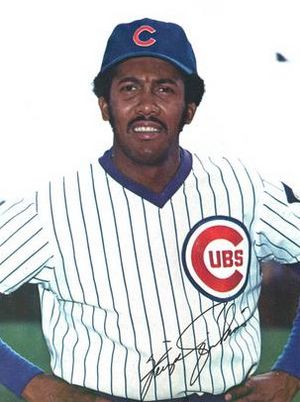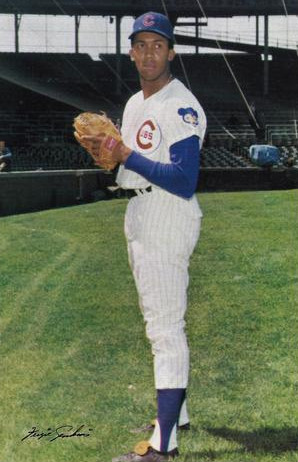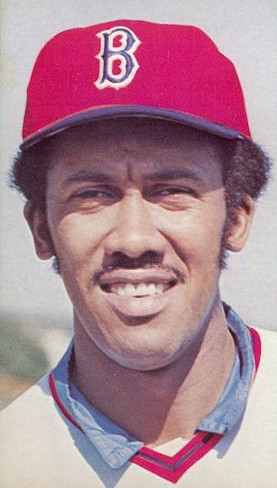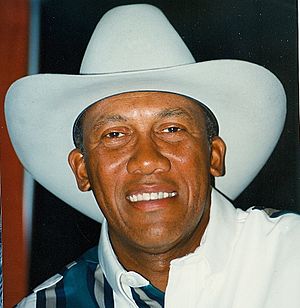Ferguson Jenkins facts for kids
Quick facts for kids Ferguson Jenkins |
|||
|---|---|---|---|

Jenkins with the Chicago Cubs in 1973
|
|||
| Pitcher | |||
| Born: December 13, 1942 Chatham, Ontario, Canada |
|||
|
|||
| debut | |||
| September 10, 1965, for the Philadelphia Phillies | |||
| Last appearance | |||
| September 26, 1983, for the Chicago Cubs | |||
| MLB statistics | |||
| Win–loss record | 284–226 | ||
| Earned run average | 3.34 | ||
| Strikeouts | 3,192 | ||
| Teams | |||
|
|||
| Career highlights and awards | |||
|
|||
| Induction | 1991 | ||
| Vote | 75.4% (third ballot) | ||
Ferguson Arthur "Fergie" Jenkins is a famous Canadian former professional baseball pitcher. He also worked as a coach. He played in Major League Baseball (MLB) from 1965 to 1983. His teams included the Philadelphia Phillies, Chicago Cubs, Texas Rangers, and Boston Red Sox.
Jenkins spent most of his career with the Chicago Cubs. He was chosen as an All-Star three times. In 1971, he became the first Canadian and first Cubs pitcher to win a Cy Young Award. This award goes to the best pitcher in each league. He won 20 or more games in seven different seasons. Six of these were in a row with the Cubs. He led the National League in wins in 1971 and the American League in wins in 1974.
Jenkins also led the NL in complete games (pitching an entire game) in 1967, 1970, and 1971. He led the AL in complete games in 1974. He was the NL leader in strikeouts in 1969. During his career, he had over 3,000 strikeouts. His 284 wins are the most by any black pitcher in major league history.
When it was not baseball season, Jenkins played basketball for the Harlem Globetrotters from 1967 to 1969. After his MLB career, he pitched for two seasons in Canada for the minor league London Majors. In 1991, Jenkins became the first Canadian to be put into the National Baseball Hall of Fame. He was the only Canadian there until Larry Walker joined him in 2020.
Contents
Early Life and Sports Beginnings
Jenkins was born and grew up in Chatham, Ontario, Canada. He was the only child of Delores Jackson and Ferguson Jenkins Sr. His father was a chef and driver. His mother's family had escaped slavery in America and settled in Canada. Both of his parents were good athletes. His father was an amateur boxer and played semi-professional baseball.
Fergie was a very talented athlete. In school, he played track and field, ice hockey, and basketball. He earned five varsity letters for his sports. When he started playing baseball as a teenager, he first played first baseman. He practiced his pitching by throwing pieces of coal. He aimed at an open ice chute or gaps in passing boxcars. A former baseball player and scout named Gene Dziadura encouraged him to keep working on his pitching. They had many training sessions until Jenkins finished high school.
Professional Baseball Career
Joining Major League Baseball
In 1962, a scout for the Philadelphia Phillies signed Jenkins. He made his first appearance in the major leagues in 1965. He was 22 years old and played as a relief pitcher. The next year, he was traded to the Chicago Cubs. This trade helped him become one of the best pitchers in baseball.
In 1967, his first full year as a starting pitcher for the Cubs, Jenkins won 20 games. He had a 2.80 ERA (which means he gave up few runs) and 236 strikeouts. He was second in the Cy Young Award voting that year. He was also picked for the All-Star Game for the first time.
The next year, 1968, his performance got even better. He won 20 games again. His ERA went down to 2.63, and he had 260 strikeouts. Jenkins became known for his great pitching even though he played in a "hitter's ballpark," Wrigley Field in Chicago. In 1968, he lost five games by a score of 1–0.
His Amazing 1971 Season
Jenkins had his best season in 1971. On April 6, 1971, he started the Cubs' opening game. The Cubs won 2–1 against the St. Louis Cardinals in 10 innings. Jenkins pitched the whole game for the Cubs. Billy Williams hit a home run to win the game. On September 1, 1971, Jenkins pitched another complete game. He also hit two home runs in that game! The Cubs won 5–2. He was named the NL Player of the Month in July. He had a 6–1 record, a 2.14 ERA, and 49 strikeouts that month.
In 1971, Jenkins pitched a complete game in 30 of his 39 starts. He finished the season with 24 wins and 13 losses. He only walked 37 batters while striking out 263 batters in 325 innings. He played in the All-Star Game. Jenkins also showed he was a good hitter. He hit six home runs and had 20 runs batted in.
Jenkins won the 1971 NL Cy Young Award. He was the first Cubs pitcher and the first Canadian to win this award. He received 17 out of 24 first-place votes.
Later Years in MLB
In 1972, Jenkins completed his sixth year in a row with 20 or more wins. By the middle of the next season, he felt tired of playing baseball. He finished the season with 14 wins and 16 losses.
Jenkins was traded from the Cubs to the Texas Rangers in October 1973. The Rangers' manager, Billy Martin, was very happy about getting Jenkins. He called him a hard worker and a winner. In 1974, Jenkins had his best year for wins, with 25 victories. This is still a record for the Rangers team. He finished second in the Cy Young Award voting that year. He was also named the American League Comeback Player of the Year.
Jenkins got his 250th win on May 23, 1980. He retired from MLB after the 1983 season.
Life After Major League Baseball
Playing in Canada
After retiring from MLB in 1983, Jenkins continued to play professional baseball in Canada. He pitched for two seasons for the London Majors. This was a minor league team in the Intercounty Major Baseball League in London, Ontario.
Off the Field and Honors
Jenkins has received many honors for his amazing career. He led the league in wins twice (1971, 1974). He also led in fewest walks per 9 innings five times. He led in complete games nine times. His streak of six straight seasons with 20 or more wins (1967–1972) is one of the longest in baseball history.
Jenkins is one of only a few pitchers to have more than 3,000 strikeouts and fewer than 1,000 walks. He got his 3,000th strikeout on May 25, 1982. As a hitter, Jenkins hit 13 home runs and had 85 RBI.
Jenkins is part of a special group called the "Black Aces." These are black pitchers who won at least 20 games in a single MLB season.
Awards and Recognition
 |
|
| Ferguson Jenkins's number 31 was retired by the Chicago Cubs in 2009. |
In 1974, Jenkins became the first baseball player to win the Lou Marsh Trophy. This award goes to Canada's top athlete each year. He was also named the Canadian Press male athlete of the year four times (1967, 1968, 1971, and 1974).
In 1987, Jenkins was inducted into Canada's Sports Hall of Fame. He was also inducted into the Canadian Baseball Hall of Fame in 1987. In 1991, he made history as the first Canadian to be elected to the Baseball Hall of Fame in Cooperstown, New York. The 1991 Major League Baseball All-Star Game in Toronto was dedicated to him. He threw out the first pitch.
Jenkins was inducted into the Ontario Sports Hall of Fame in 1995. In 2001, he was added to Canada's Walk of Fame. He was inducted into the Texas Rangers Hall of Fame in 2004. In 2011, the Ontario Sports Hall of Fame created the Ferguson Jenkins Heritage Award in his honor.
On December 17, 1979, he was made a Member of the Order of Canada. This is a high honor for Canadians. On May 3, 2009, the Cubs retired jersey number 31 to honor both Jenkins and Greg Maddux. On December 13, 2010, Canada Post announced that Jenkins would be honored with his own postage stamp. The stamp was released on February 1, 2011, for Black History Month. On May 20, 2022, a statue of Jenkins was placed outside Wrigley Field.
See also
- List of Major League Baseball career wins leaders
- List of Major League Baseball players from Canada
- List of Major League Baseball annual strikeout leaders
- List of Major League Baseball annual wins leaders
- List of Major League Baseball career strikeout leaders
- List of members of Canada's Sports Hall of Fame
- List of Canadian sports personalities
 | James Van Der Zee |
 | Alma Thomas |
 | Ellis Wilson |
 | Margaret Taylor-Burroughs |




